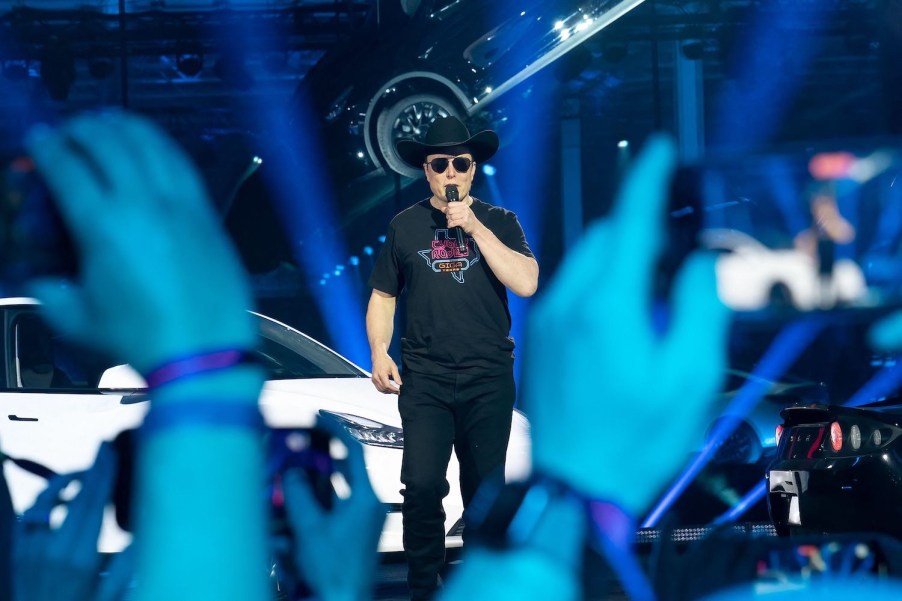
Ford CEO Slams Tesla Cybertruck, Saying ‘I Make Trucks For Real People Who Do Real Work’
Ford CEO Jim Farley isn’t sweating the Tesla Cybertruck. He is making that clear in his most-recent comments about the long-awaited Tesla truck. His reasoning for feeling so cool is that he believes the Ford F-150 Lightning and the Cybertruck aren’t competitors. He said the Cybertruck is for “Silicon Valley people,” and the Lightning is “…for real people who work.”
Will the Tesla Cybertruck hurt the Ford F-150 Lightning?
CNBC’s Jim Cramer recently interviewed the Ford CEO. During the talk, Cramer insinuated that the Cybertruck might have Ford nervous about the electric truck competition. Farley dismissed these questions saying, “The reality is, America loves an underdog — and we are the market leader for EV trucks and vans, and we know those customers better than anyone,” Farley said. ‘”And if he wants to design a Cybertruck for Silicon Valley people, fine.”
In the truck world, whether people will use their trucks for working or not, these are fightin’ words. Pickup truck marketing is all predicated on the idea that if you get a truck, you’ll be able to do hard work with it. Keep in mind that in many cases, actually doing that work is very much not the point. It is the idea that is being sold. Farley is sending out a dog whistle to the truck folks who know an authenticity claim for Ford is better marketing against the Tesla Cybertruck than anything else could be.
According to Business Insider, He went on to describe the Tesla truck as “a cool high-end product parked in front of a hotel.” Adding salt to the wound, “I don’t make trucks like that,” Farley said. “I make trucks for real people who do real work, and that’s a different kind of truck.”
Tesla’s first pickup truck

Ford is one of the first companies to produce an electric pickup truck for the market. This early foothold is one of the biggest boons for Ford’s confidence here. Last year, Ford delivered 13,000 F-150 Lightning models of the nearly 200,000 reserved.
Despite Ford’s lead on the electric truck, Tesla still has the market share of EVs by a country mile. The fact that Tesla is the world’s leader in EV production, sales, and culture will certainly make this fight a good one.
The Ford F-150 is about as worthy an opponent as it gets. However, the Tesla Cybertruck might be the only way to fight it. It is such a departure from what we are used to that it’ll likely hit the market with force. This, of course, is all dependent on how production for the model goes.
What do we know about the Tesla Cybertruck?

Although Farley cracked off shots at Tesla and its Cybertruck, the Tesla spokesperson made no comment in response. Tesla has yet to confirm pricing on the new truck. The going theory, according to KBB, is that the Cybertruck might start around $50k, which is about $10k less than the Lightning. Elon Musk claims the Cybertruck will release sometime this year, and deliveries should begin by the end of the year. It is important to note that the billionaire CEO has promised the Tesla truck multiple times in the past. So far, the truck is two years late from its initial release date when the truck was announced in 2019. According to a leaked Tesla report from May, the Tesla Cybertruck still had some design issues. The suspension, handling, and braking still needed work.
While we still don’t have a clear picture of what to expect from the Cybertruck, it is clear that this interesting yet bizarre truck isn’t likely to be a hit with contractors as a working truck. However, we are living in a quickly changing world where the things we are used to seeing are shifting. It is easy to see that the way we use pickup trucks and, in turn, the way trucks look are all subject to change.
Ford and Tesla work together

Despite the beef, only weeks before this interview, Ford announced its plans to adopt the Tesla charging port to make use of the Tesla charging network. This network is Tesla’s strongest asset. When asked about why Ford partnered with Tesla in this way, Ford CEO Jim Farley said simply that it was “good for customers.”





